-
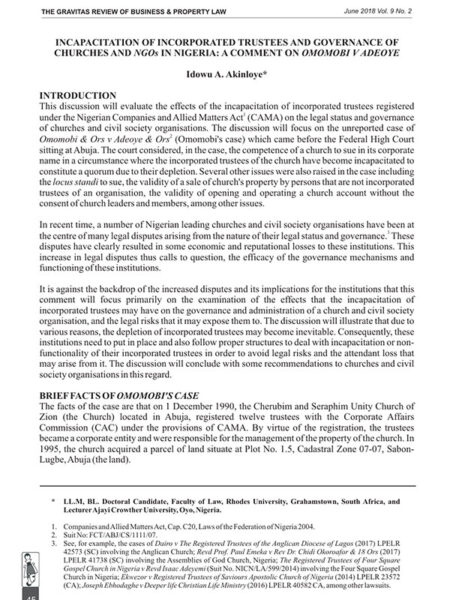
Incapacitation of Incorporated Trustees and Governance of Churches and NGOs in Nigeria: A Commentary of Omomobi v Adeoye
0₦2,500.00Idowu Akinloye, Lecturer Ajayi Crowther University, Oyo and Doctoral Candidate, Rhodes University, Grahamstown, South Africa in his article, Incapacitation of Incorporated Trustees and Governance of Churches and NGOs in Nigeria: A Commentary on Omomobi v Adeoye, examines how a church or civil society organisation may institute legal proceedings or otherwise function where the trustees are all dead, depleted or incapable of functioning.
-
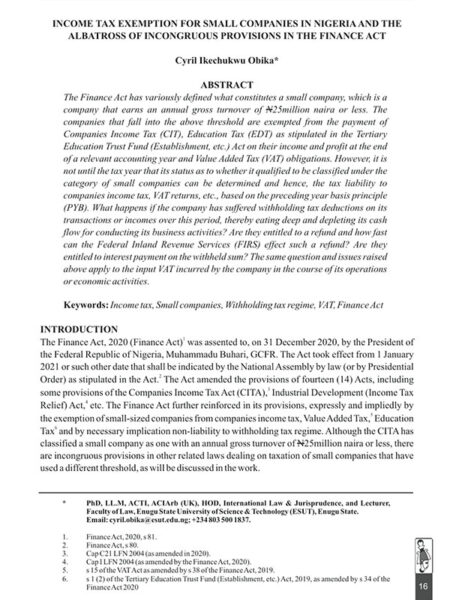
Income Tax Exemption for Small Companies in Nigeria and the Albatross of Incongruous Provisions in The Finance Act
0₦2,500.00Dr Cyril Obika HOD International Law & Jurisprudence, Faculty of Law, Enugu State University of Science & Technology, in his article, Income Tax Exemption for Small Companies in Nigeria and the Albatross of Incongruous Provisions in The Finance Act, examines the provisions of the Finance Act that exempt small companies from the payment of several taxes. He considers the definitions of a ‘small company’ in various tax laws, noting the differences in the threshold to qualification as a small company in these laws. Dr Obika argues that categorising a company as ‘small’ can only be determined at the end of a relevant assessment year and effected in the tax year. He opines that the status of a small company should be presumed for the same company in subsequent years until proven to the contrary that the company has exceeded the threshold set by legislation.
-
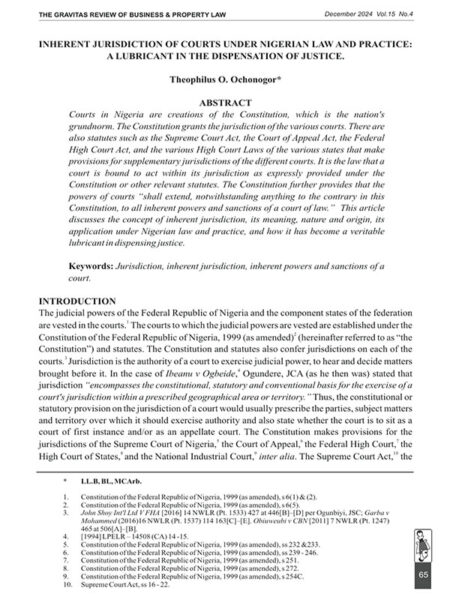
Inherent Jurisdiction of Courts under Nigerian Law and Practice: A Lubricant in the Dispensation of Justice
0₦2,500.00Theophilus Ochonogor in his article, Inherent Jurisdiction of Courts under Nigerian Law and Practice: A Lubricant in the Dispensation of Justice, discusses the concept of inherent jurisdiction, its meaning, nature and origin, its application under Nigerian law and practice, and how it has become a veritable lubricant in the dispensation of justice. Courts in Nigeria are creations of the Constitution, which is the nation’s grundnorm. The Constitution grants the jurisdictions of the various courts. There are also such statutes as the Supreme Court Act, the Court of Appeal Act, the Federal High Court Act and the various High Court Laws of the various states which make provisions for supplementary jurisdictions of the different courts. It is the law that a court is bound to act within its jurisdiction as expressly provided under the Constitution or other relevant statute. The Constitution further provides that the powers of courts “shall extend, notwithstanding anything to the contrary in this Constitution, to all inherent powers and sanctions of a court of law.”
-
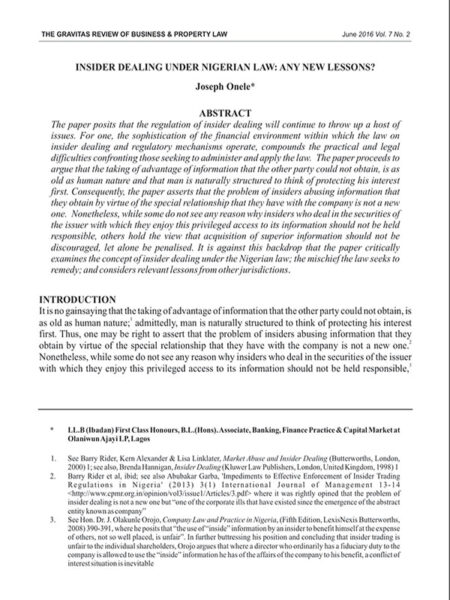
Insider Dealing under Nigerian Law: Any New Lessons?
0₦2,500.00Joseph Onele, Associate, Olaniwun Ajayi LP in “Insider Dealing Under Nigerian Law: Any New Lessons?” undertakes a comprehensive review of the legal framework for dealing with insider trading under Nigerian Law. He identifies notable gaps in the law and indicates lessons that can be learnt from other jurisdictions including the U.S and UK.
-
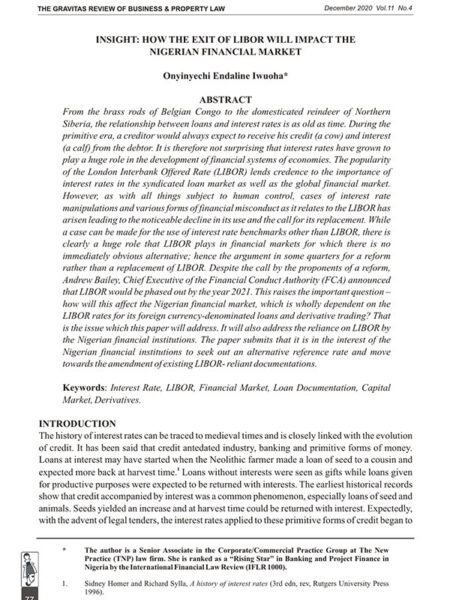
Insight: How the Exit of LIBOR Will Impact the Nigerian Financial Market
0₦2,500.00Onyinyechi Iwuoha, Senior Associate at the TNP Law Firm in her article, Insight: How the Exit of LIBOR Will Impact the Nigerian Financial Market, notes the popularity of the London Interbank Offered Rate (LIBOR) in financial markets worldwide. With the impending phasing out of LIBOR in 2021 by the (UK) Financial Conduct Authority due to what became known as the ‘LIBOR Scandal’, Onyinyenchi addresses how the exit of LIBOR would affect the Nigerian financial market which is wholly dependent on the LIBOR rates for its foreign currency-denominated loans and derivative trading; what alternative reference rates there are, and the amendment of existing LIBOR-reliant documentations.
-
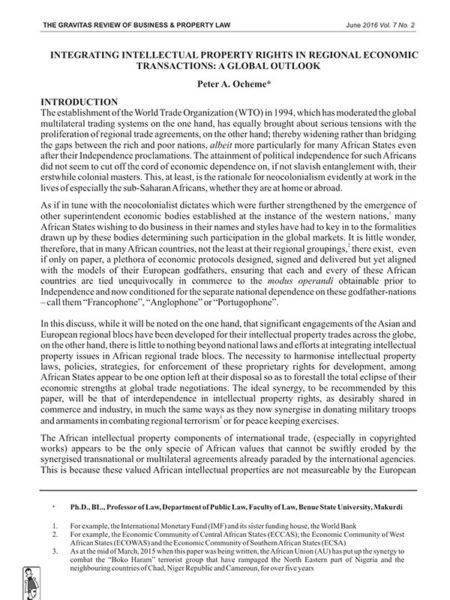
Integrating Intellectual Property Rights in Regional Economic Transactions: A Global Outlook
0₦2,500.00Professor Peter Ocheme of the Department of Public Law, Faculty of Law, Benue State University, Makurdi in his article, “Integrating Intellectual Property Rights in Regional Economic Transactions: A Global Outlook” examines African, European, American and Asian efforts at integrating intellectual property rights in regional economic transactions and the varying levels of success. He notes that while significant engagements of the Asian and European regional blocs have been developed for their intellectual property trades across the globe, there is little or nothing beyond national laws and efforts at integrating intellectual property issues in African regional trade blocs. He interrogates the concept and relevance of intellectual property rights protocols and agreements to developing countries and contends that they may have sacrificed their individual and collective efforts at the altar of international law and diplomacy.
-
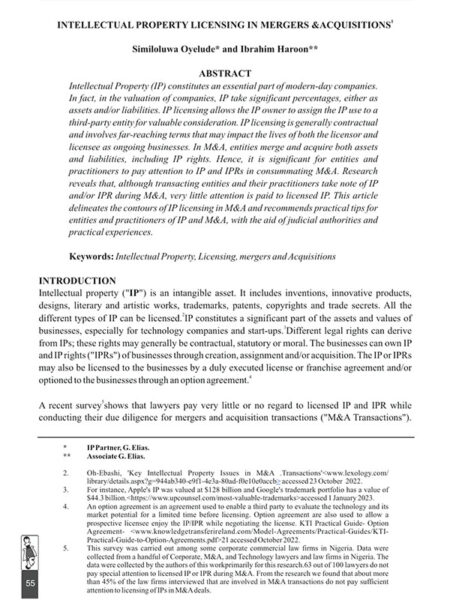
Intellectual Property Licensing in Mergers and Acquisitions
0₦2,500.00Similoluwa Oyelude and Haroon Ibrahim in his article, Intellectual Property Licensing in Mergers and Acquisitions, delineate the contours of IP licensing in M&A and recommends practical tips that are helpful for entities and practitioners of IP and M&A, with the aid of judicial authorities and practical experiences
-
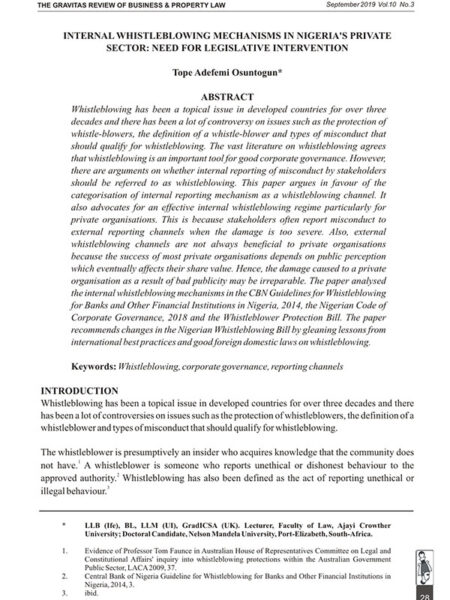
Internal Whistleblowing Mechanisms in Nigeria’s Private Sector: Need for Legislative Intervention
0₦2,500.00Tope Osuntogun of the Faculty of Law, Ajayi Crowther University, Oyo Nigeria, in her article, Internal Whistleblowing Mechanisms in Nigeria’s Private Sector: Need for Legislative Intervention makes a case for the categorisation of internal reporting mechanism as a whistleblowing channel while positing that whistleblowing is an effective tool for combatting corporate fraud. She comprehensively reviews Nigeria’s regulatory framework for whistleblowing in the private sector including a review of the Investment and Securities Act 2007, the Central Bank of Nigeria Act 2007, the CBN Guidelines for Whistleblowing for Banks and Other Financial Institutions in Nigeria 2014, and the Nigerian Code of Corporate Governance 2018.
-
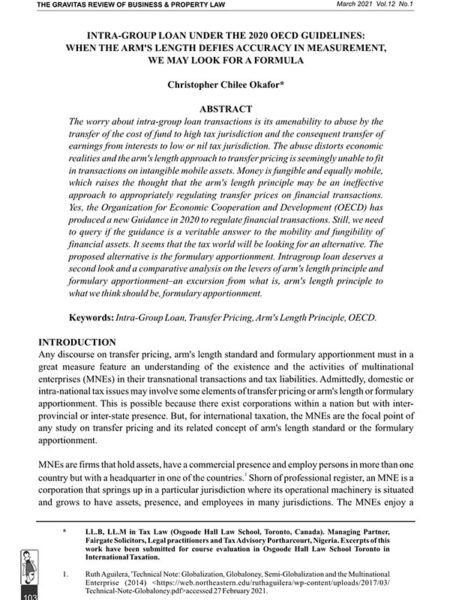
Intra-Group Loan Under the 2020 OECD Guidelines: When the Arm’s Length Defies Accuracy in Measurement, We May Look for a Formula
0₦2,500.00Christopher Okafor, Managing Partner, Fairgate Solicitors, Legal Practitioners and Tax Advisory Port Harcourt, Nigeria, in his article, Intra-Group Loan Under the 2020 OECD Guidelines: When the Arm’s Length Defies Accuracy in Measurement, We May Look for a Formula, argues that the worry about intra-group loan transactions is its amenability to abuse by the transfer of the cost of fund to high tax jurisdiction and the consequent transfer of earnings from interests to low or nil tax jurisdiction. The abuse distorts economic realities, and the arm’s length approach to transfer pricing is seemingly unable to fit in transactions on intangible mobile assets. Though the Organization for Economic Cooperation and Development (OECD) has produced a new Guidance in 2020 to regulate intra-group loan, it is moot whether the guidance is a veritable answer to the mobility and fungibility of financial assets. Christopher proposes an alternative to the arm’s length principle. In his words, intragroup loan deserves a second look and a comparative analysis on the levers of arm’s length principle and formulary apportionment–an excursion from what is, arm’s length principle to what we think should be, formulary apportionment.
-
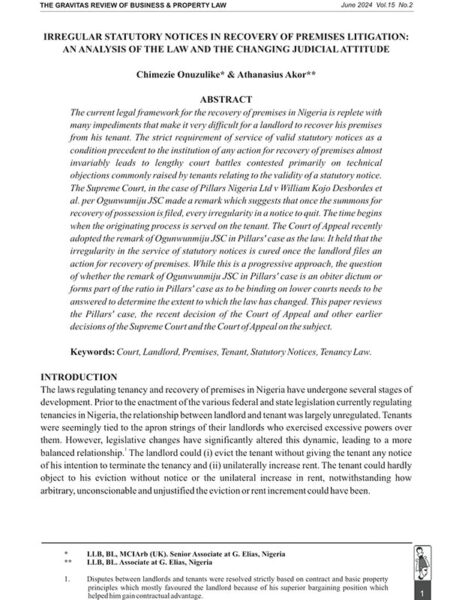
Irregular Statutory Notices in Recovery of Premises Litigation: An Analysis of the Law and the Changing Judicial Attitude
0₦2,500.00In their article, Irregular Statutory Notices in Recovery of Premises Litigation: An Analysis of the Law and the Changing Judicial Attitude, Chimizie Onuzulike and Athanasius Akor, bring to our attention the recent developments in the law and practice on recovery of tenanted premises. The current legal framework on recovery of premises in Nigeria is replete with very many impediments that make it very difficult for a landlord to recover his premises from his tenant. The strict requirement of service of valid statutory notices as condition precedent to the institution of any action for recovery of premises almost invariably, lead to lengthy court battles contested primarily on technical objections commonly raised by tenants relating to validity of a statutory notice. The Supreme Court, in the case of Pillars Nigeria Ltd v. William Kojo Desbordes et al. per Ogunwumiju JSC recently made a remark which seems to suggest that once the summons for recovery of possession is filed, every irregularity in a notice to quit is cured and the time begins to run from the date the originating process is served on the tenant. The Court of Appeal recently adopted the remark of Ogunwunmiju JSC in Pillars’ case as the law and held that the irregularity in the service of statutory notices is cured once an action for recovery of premises is filed by the landlord. While this is a progressive approach, the question whether the remark of Ogunwunmiju JSC in Pillars’ case is an obiter dictum or forms part of the ratio in Pillars’ case as to be binding on lower courts needs to be answered to determine the extent to which the law has changed. Onuzulike and Akor review the Pillars’ case, the recent decision of the Court of Appeal and other earlier decisions of the Supreme Court and the Court of Appeal on the subject.
-
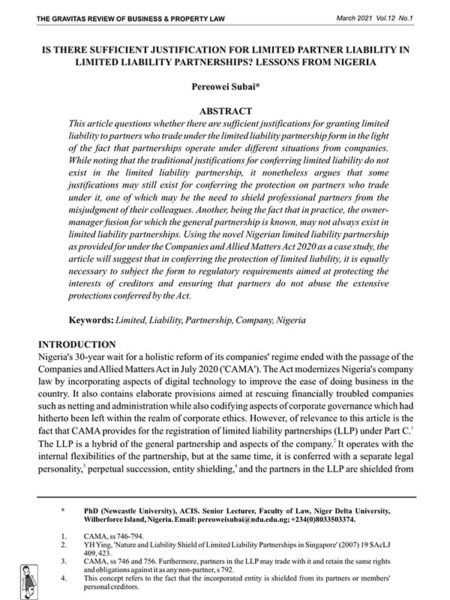
Is There Sufficient Justification for Limited Partner Liability in Limited Liability Partnerships? Lessons from Nigeria
0₦2,500.00Dr Pereowei Subai, Senior Lecturer, Faculty of Law Niger Delta University Wilberforce Island Nigeria in his article, Is There Sufficient Justification for Limited Partner Liability in Limited Liability Partnerships? Lessons from Nigeria, questions whether there are sufficient justifications for granting limited liability to partners who trade under limited liability partnership in the light of the fact that partnerships operate under different situations from companies. While the traditional justifications for conferring limited liability do not exist in the limited liability partnership, Dr Subai argues that some justifications may still exist for granting the protection on partners who trade under it. A significant reason is the need to shield professional partners from the misjudgment of their colleagues. Using the Companies and Allied Matters Act 2020 as a case study, Dr Subai suggests that in conferring the protection of limited liability, it is necessary to subject the form to regulatory requirements aimed at protecting the interests of creditors and ensuring that partners do not abuse the extensive protections conferred by the Act.
-
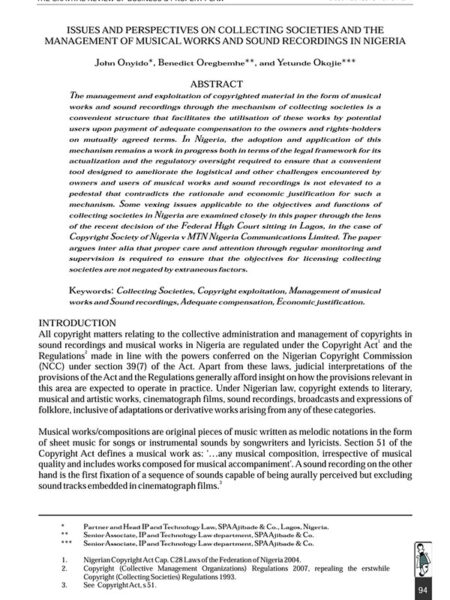
Issues and Perspectives on Collecting Societies and the Management of Musical Works and Sound Recordings in Nigeria
0₦2,500.00John Onyido, Benedict Oregbemhe, and Yetunde Okojie, Partner and Associates respectively at SPA Ajibade & Co. in their article, Issues and Perspectives on Collecting Societies and the Management of Musical Works and Sound Recordings in Nigeria, note that the management and exploitation of copyrighted materials through the mechanism of collecting societies is a convenient structure that facilitates the utilisation of musical works and sound recordings by potential users. Using the Copyright Society of Nigeria v MTN Nigeria Communications Limited as a signpost, Onyido et al consider pertinent issues relating to artistes’ relationship with collecting societies including whether original copyright owners can license their work directly without involving their collecting society; whether collecting society can institute an action without joining a member whose work was infringed; and whether a collecting society can claim royalties on behalf of non-members.
The Gravitas Review of Business & Property Law



